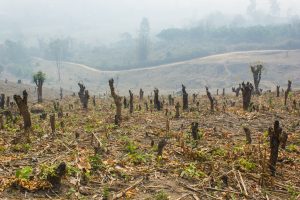“We need to have deep reverence for nature,” China’s President Xi Jinping told a crucial summit on biodiversity earlier this month. Yet he failed to mention that the Chinese government allows the import of millions of tons of beef, soy, and other agricultural commodities that are sourced from illegal deforestation and are fueling the devastation of ecosystems vital to stemming climate change.
It was is the first time the Chinese government has hosted the COP15 summit, which gathers the 196 countries that are party to the United Nations Convention on Biological Diversity. China’s environment minister, and COP15 President Huang Runqiu, made the dubious claim to delegates that the country is playing “a leading role” in the global struggle against mass extinction.
One thing China is certainly leading on is the destruction of forests. According to a WWF study, China’s imports of agricultural commodities drive more deforestation globally than any other market – including the United States and the European Union combined. Nearly 70 percent of forests cleared for agriculture around the world are razed illegally, and the annual volume of greenhouse gas released by their removal is larger than India’s emissions from fossil fuels.
Clearly the Chinese government needs to address its significant role in contributing to the problem. While Xi squandered the opportunity to announce how he’d tackle his country’s footprint on forests, the year’s most important climate summit is just around the corner. On November 1, signatories to the Paris Agreement on Climate Change will kick off a two-week summit in Glasgow. The United Kingdom, which is chairing, is expected to announce a major agreement on reversing forest loss driven by commodities. Will Xi be in on the deal?
The scale of China’s impact is notable in Brazil. Chinese imports have a major role incentivizing the destruction of the Amazon rainforest and the Cerrado savannah, where two-thirds of the land cleared of vegetation has been converted to cattle pasture. China is the final destination for nearly a third of all Brazilian beef exports.
The link is even stronger with soy. In 2017, nearly 65 percent of all the soy exported from Brazil went to China. In the last decade, between 500,000 and 800,000 hectares of recently deforested land were planted with soy every year in the Brazilian Cerrado. China’s demand for Brazilian soy has nearly tripled since 2010 and is still growing.
Ecosystems are not the only victims. Human Rights Watch research has shown that criminal networks driving illegal deforestation in the Brazilian Amazon are threatening, attacking, and killing environmental defenders. Largely illegal forest fires set by ranchers to clear land for pasture and agriculture also create casualties, with thousands of people hospitalized due to respiratory diseases linked to the air pollution caused by smoke.
“There were many cases of pneumonia because we breathed smoke day and night,” a health provider from the Araribóia Indigenous territory, in the southeastern Brazilian Amazon, told me of a fire that burned through their land. “We lost many houses and then, to make matters worse, came the hunger” due to the loss of crops and game.
Brazilian authorities’ failure to enforce environmental law and hold violators accountable is at the heart of the Amazon crisis. But rising demand for the commodities that drive deforestation provide a profitable incentive for continued destruction.
The Chinese government has long rejected international scrutiny of its own human rights record, and is also happy to turn a blind eye to rights abuses and environmental destruction in other countries, even those caused by its own actions, but this might soon boomerang on China.
In the long term, Chinese consumers’ appetite for these unsustainably sourced commodities may well contribute to collapsing the ecosystems that supply them. Deforestation in the Brazilian Amazon is pushing the rainforest toward an irreversible tipping point that, if crossed, could cause it to dry out, releasing billions of tons of carbon dioxide, disturbing weather patterns across South America – where half of all soybeans are produced – and decimating agriculture. It would send shock waves through global supply chains.
This is not inevitable, but the Chinese government needs to address its own enormous contribution to the problem. It should adopt legislation that would restrict the import of agricultural commodities linked to illegal deforestation, and rigorously enforce it. This would create a powerful incentive in favor of sustainability, pressing producers to green their supply chains. Some officials in China’s environment ministry have in fact already made this case, but the issue is yet to reach the higher echelons of power.
To be clear, it is not only China that should do this – other major markets should too. And some are. In the United Kingdom, a law that restricts such imports is already being debated by Parliament. The European Commission is expected to present draft legislation at the end of the month. And in the United States, lawmakers recently introduced a robust proposal in Congress. The Chinese government should not lag behind.

































